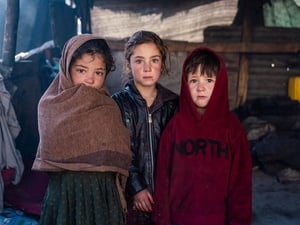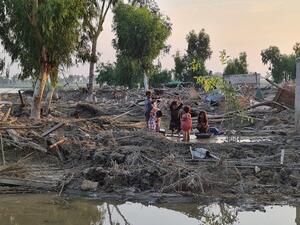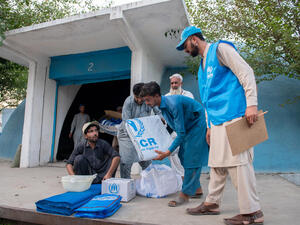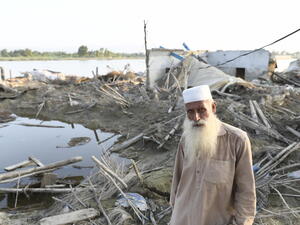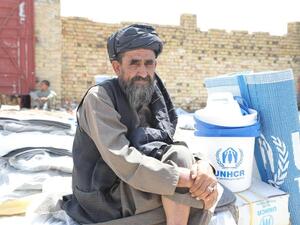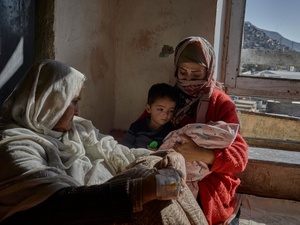Afghans fleeing economic hardship mass at Pakistani border
Afghans fleeing economic hardship mass at Pakistani border

Afghan refugee children in Pakistan's Roghnai camp.
CHAMAN, Pakistan, Jan. 2 (UNHCR) - An estimated 3,000 Afghans arrived at Pakistan's Chaman border crossing Wednesday, fleeing what they described as economic hardship caused by drought and lack of aid.
The vast majority of the refugees were not allowed into Pakistan because a camp near Roghani further inland from Chaman run by the United Arab Emirates (UAE) was undergoing construction work and could not house them. Nevertheless, about 500 of the new arrivals were registered into UNHCR's holding site at Kili Faizo.
Erik Lars, head of UNHCR's operation in Chaman, said the refugees carried large amounts of personal belongings, indicating they were not fleeing any fighting.
In recent weeks, several hundred Afghans crossed into Pakistan through the Chaman border each day, so the latest arrivals represented a large increase in the apparent number of people leaving the country.
The number of refugees going in the opposite direction and returning home from Iran and Pakistan had increased significantly recently. In the last two months alone, an estimated 60,000 refugees had repatriated.
Officially, only 290 persons crossed into Pakistan through the Chaman point Wednesday, with 2,637 returning to Afghanistan, UNHCR said, but the unofficial count of new arrivals totalled around 3,000.
One family interviewed by the refugee agency said the southern city of Kandahar they had fled was peaceful, but added they had not been able to feed their children due to the lack of humanitarian aid. Others said the drought that has hit the area for several years had wiped out their cattle.
Four Pashtun families said they fled the south-western city of Herat because of harassment by Uzbek Northern Alliance members. They said the soldiers were looting in the city and forcing people belonging to the Pashtun tribe to pay them money.
"We are likely to be confronted with space problems if such an influx continues into the Chaman area where camps are nearing full capacity," UNHCR spokeswoman Fatoumata Kaba said. The refugee agency was holding meetings Wednesday with government officials to discuss possible alternatives for accommodating the new arrivals.
UNHCR's camp at Roghani, a different facility from that run by the United Arab Emirates, is full with 17,000 refugees. The Landi Kareze camp has room for only 3,000 more people before reaching its full capacity of 10,000. The Killi Faizo staging site near the Chaman crossing is also near full capacity with 3,000 uprooted people.
In another development, UNHCR transferred 1,600 more refugees Wednesday from the squalid Jalozai camp near Peshawar to other, better suited sites.


